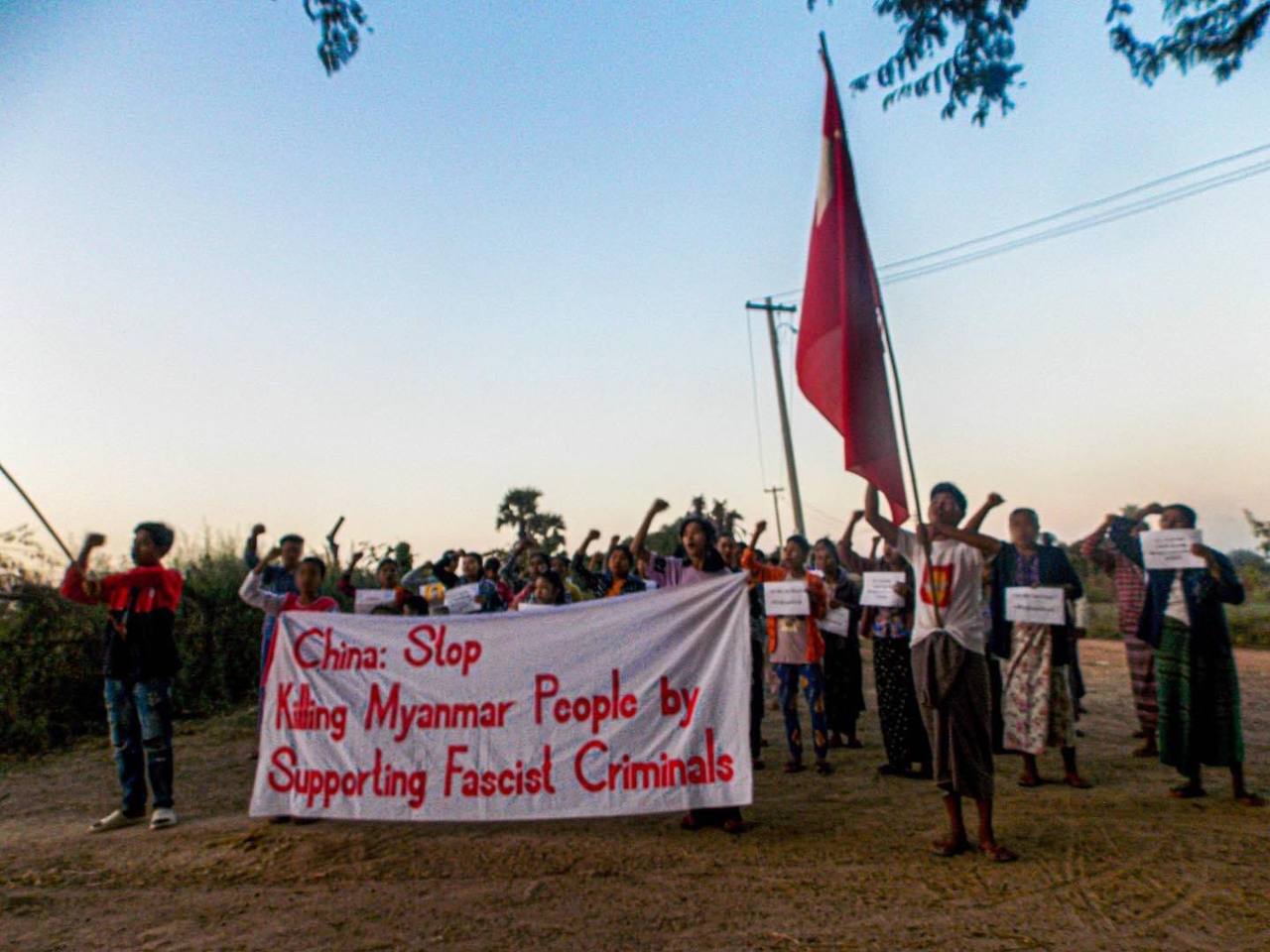From the start of the coup, the junta (SAC) faced a series of sanctions and
diplomatic pressure imposed by the Western superpowers. The military junta (SAC), being isolated from the West, was left with no choice but to increase its reliance on Russia, China, and India. Furthermore, the fragile economy during the post-coup era led to the balance-of-payment crisis. SAC turns to the BRICS economic bloc to solve the dollar crisis for support and potential membership. SAC implemented a de-dollarisation process by allowing and promoting the usage of Yuan and other currencies for import-export. The Bonapartists Kremlin-Naypyidaw alliance (alliance between Russia and the junta) has also been tighter to escape from being isolated. On the one hand, China did not denounce the military coup and continues to show its diplomatic support. However, it still maintained good relationships with ethnic armed organisations along its border.
Meanwhile, the turmoil situation becomes a sweet spot for criminal organisations to run their cyber-scams, drugs, and human trafficking businesses. The organised
crimes are committed publicly, mainly in the northern part of Shan state, near the China border. Historically, those areas are a haven for drug lords and organised crimes since most of those areas are under the autonomy of warlords handpicked by the Tatmadaw (Burmese military). The organised crime ring is run by the Chinese Mafias as well as the state-sponsored militias (pyi-thu sit), the Border Guard Force leaders (BGF, separatists of ethnic armed organisations who operate as a division under the junta), and the administration officials of the Self-administered zones in the Northern Shan state. Those criminal syndicates must make their tribunal to respective military commanding officers in those areas in return for protection. The activity of those organisations has significant impacts on China as the cyber scam organisations have been siphoning millions out of them, and many of their nationals are being kidnapped and scammed and forced to work for the scamming activities. The rising unemployment rate in China and its fragile economy became an opportunity for crime syndicates. Beijing also expressed it as a national threat to stop further grievances, which has the potential to cause instability back home.
In October 2023, “The Three Brotherhood Alliance”, the alliance between the
Arakan Army, Myanmar National Democratic Alliance Army and Ta’ang National
Liberation Army launched Operation 1027, with Mandalay People’s Defense Force,
People’s Liberation Army, Bamar People’s Liberation Army fighting alongside them. The alliance manifested not only to topple the military regime but also to eradicate cyber scam organisations. The message regarding the cyber scam clearly intended that their interests aligned with Beijing’s. Junta was placed in a very sticky situation, as it can be observed that they are not able to tackle the cyber scam issue for multiple reasons: its military officers in those regions are corrupted by providing custody, and if they handed over the BGF leaders, militia leaders, and administration officials, their status-quo in those regions will be challenged. The Three Brotherhood Alliance seized this opportunity while the junta was hesitant and impotent.
It is crucial for the Three Brotherhood Alliance to show that they have common
interests with Beijing because there are scenarios where they need to rely on China to be able to launch a full-scale war. The Three Brotherhood Alliance and other revolution forces in Northern Burma have been using China-made Type-81 assault rifles. If China imposed tighter border trade measures, the availability of arms, ammunition, food, and medical supplies would be minimal. Compared to the revolution forces of Chinland, along the border of India, the supplies are limited since India’s border force, Assam Rifles has been restricting what goes through its borders. It can also be seen that they are still relying on bolt action rifles due to limited supplies. Therefore, there are differences in the nature of the revolution between China's and India's borders.
Despite the nationwide war, both parties left the Chinese state-owned projects
unharmed. Beijing hedging its bets in both parties also protects its China-Myanmar Economic Corridor project. China’s spokesperson for the Ministry of Foreign Affairs, Wang Wenbin, stated, “…China will continue its effort in helping to stop the fighting and promote talks in northern Myanmar and jointly work for a soft landing of the situation in northern Burma. We also hope that parties concerned in Myanmar will keep the China-Burma border area peaceful and stable and protect the safety and security of Chinese projects and personnel in Myanmar.” during a regular press conference on December 21, 2023. Beijing had brokered ceasefire negotiations between the junta and The Three Brotherhood Alliance in Kunming and a ceasefire agreement has been made in Northern Shan state. Moreover, on January 1, 2024, the diaspora government - the National Unity Government which was formed after the coup with elected legislators, activists and some of the ministers from the NLD-led quasi-democratic government showed its allegiance to Beijing in its statement by declaring its support for the One China policy and assuring that China’s economic investments will be safeguarded.
As anarchists, we align with the resistance against the fascist regime, advocating
for genuine liberation, self-determination, and autonomy for the region. We caution against statist organisations cloaked in a 'national liberation' agenda, as they may only reconstitute the ruling class without achieving true liberation for the oppressed masses. It is imperative to recognize the presence of various local defence forces (LDFs), rooted in various regions and communities in Burma, bravely resisting the fascist regime without reliance on support from imperialist powers. To realize a revolution that fully emancipates the oppressed working class in the region, fostering cross-border solidarity among the working class and embracing internationalism becomes paramount. Rather than safeguarding Beijing's economic and geopolitical interests in exchange for support, expressing solidarity with the oppressed working class under the CCP regime, supporting the Uyghurs, and advocating for the liberation of Hong Kong are crucial.
Comrade Kay
